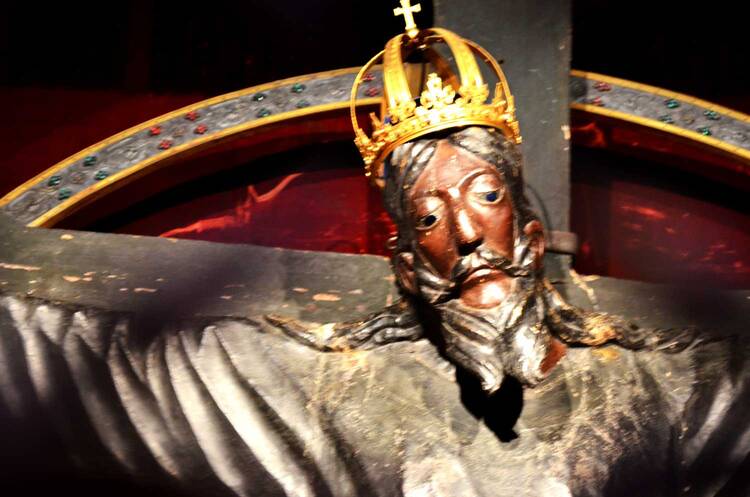A Reflection for the Solemnity of Our Lord Jesus Christ, King of the Universe
Readings: 2 Samuel 5:1-3 Colossians 1:12-20 Luke 23:35-43
Betsy Balcombe has an historical distinction. She was the last person to engage Napoleon Bonaparte in physical combat. The English girl did so at the age of 13. Her father worked for the East India Company as a purveyor of supplies on the small island of St. Helena, where the emperor was sent into his final exile.
There were very few people on the island. Both the emperor and the girl could have used a companion. She called him “Boney.” Graham Robb, in his France: An Adventure History (2022) retrieves the story.
One day, having been pestered several times, “Boney” finally consented to play the game of blind man’s bluff. Slips of paper were handed out and—she suspected, by imperial sleight of hand—Betsy received the slip on which the fateful words “la mort” were written. Napoleon tied his cambric handkerchief tightly over her eyes, then waved his hat in front of her face. Betsy flinched…“Ah, leetle monkee,” he said in English, “you can see pretty well!” A second handkerchief was tied over the first, and the game began.
Once a king, always a king? Our modern conception of public rule, whether democratic or autocratic, is quite different than that of our ancestors. We think of those who rule primarily in terms of function. It is something they do, not who they are.
There is no distance between what Christ does and who he is.
But even Napoleon, who rose to power because of what he could do, always sought to show that he ruled by virtue of who he was: the choice of God or, at the least, of fate. Betsy’s story shows that even stripped of power, Napoleon remained himself. Even his assault tactics stayed the same. Here, surprise by feint.
The emperor commenced by creeping stealthily up to me, and giving my nose a very sharp twinge; I knew it was he both from the act itself and from his footstep. I darted forward, and very nearly succeeded in catching him, but bounding actively away, he eluded my grasp. I then groped about, and, advancing again, he this time took hold of my ear and pulled it. I stretched out my hands instantly, and in the exultation of the moment screamed out, “I have got you—I have got you, now you shall be blindfolded!” But to my mortification it proved to be my sister, under cover of whom Napoleon had advanced, his hand over her head.
The Solemnity of Christ the King is not an old feast. It was created by Pius XI in 1925. The pope had his own political considerations. Ancient monarchies were being replaced by new republics in Europe, and colonial powers were ceding large territories to new governments in South and Central America. The idea that power came from people alone, independent of God’s will as expressed through the Catholic Church, was an idea that needed trimming.
The papacy lost that contest, but the notion of Christ the King dates to the very beginnings of the faith. What might the feast say to us, at a time when liberal democracies seem to be retreating in the face of more autocratic regimes?
To follow this king, Christ, through the darkness and into the light, to someday reign with him, is to surrender power, not seize it.
An answer may lie in that phrase, “Once a king, always a king.” We argue over the origins of legitimately exercised power. Does it come from ancestry or from the people themselves? Or is it simply that whoever has power seizes more of it? Whether on the battlefield or in the ballot box, we struggle for power. In all these forms, we distinguish power itself from those who possess it.
Yet there is no distance between what Christ does and who he is. He is the presence and power of God among us. But Christ reigns as king by not grasping power. He is an eternal sacrifice, and what he does is to surrender power, ostensibly to his enemies, those who seek his death, but ultimately to his Father, who willed that he should enter death itself, the unfathomed depth of our alienation from God.
The rulers sneered at Jesus and said,
“He saved others, let him save himself
if he is the chosen one, the Christ of God.”
Even the soldiers jeered at him.
As they approached to offer him wine they called out,
“If you are King of the Jews, save yourself.”
Above him there was an inscription that read,
“This is the King of the Jews” (Lk 23:35-38).
In St. Luke’s Gospel, irony is used to proclaim the deepest of truths. Christ is king because, as officers on battlefields did in the time of Napoleon, he leads the way. He has no need to rebuke mere sycophants. He enters the darkness to assail evil itself. The king dies so that his people may live.
No one should yield power to a tyrant, but living in the shadow of the cross, we must always ask ourselves this personal, probing question, “Am I the tyrant?” “Am I the one who insists upon my own will?”
What does this mean for us? It means that our happiness, our personal well-being, is accomplished not in seizing power but in surrendering it.
No one should yield power to a tyrant, but living in the shadow of the cross, we must always ask ourselves this personal, probing question, “Am I the tyrant?” “Am I the one who insists upon my own will?”
To follow this king through the darkness and into the light, to someday reign with him, is to surrender power, not seize it.








